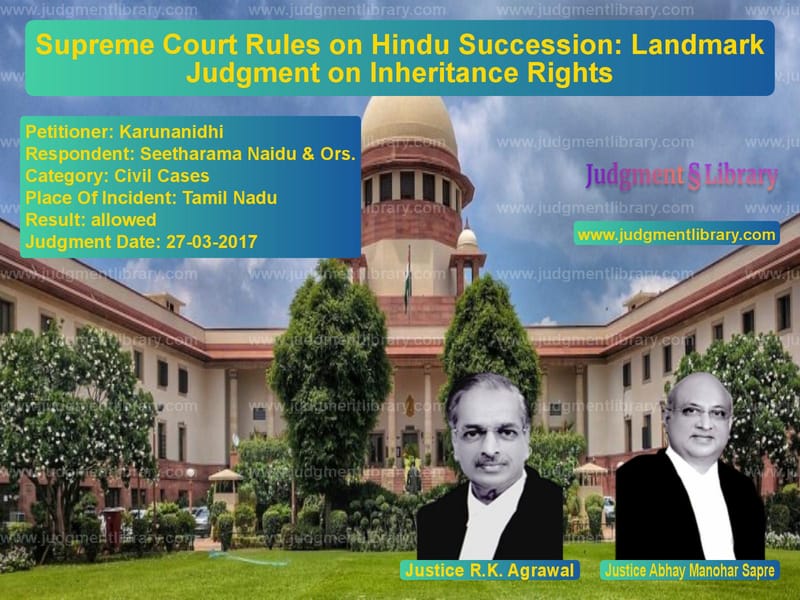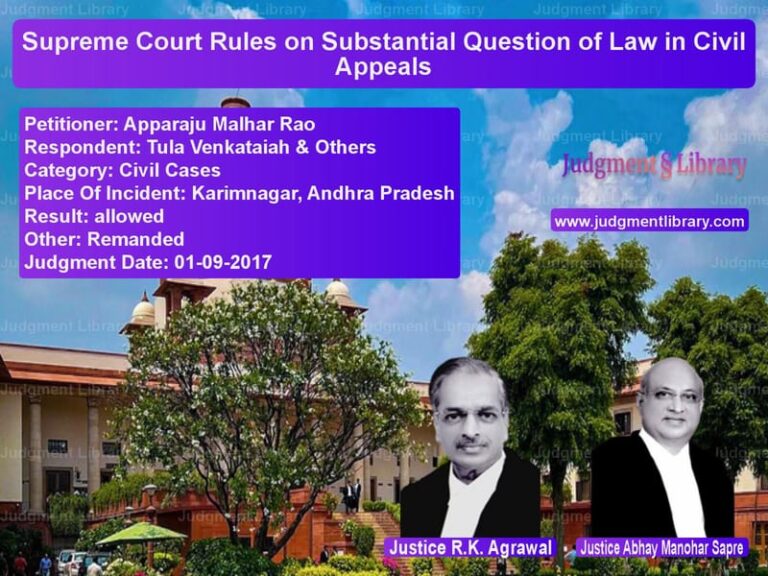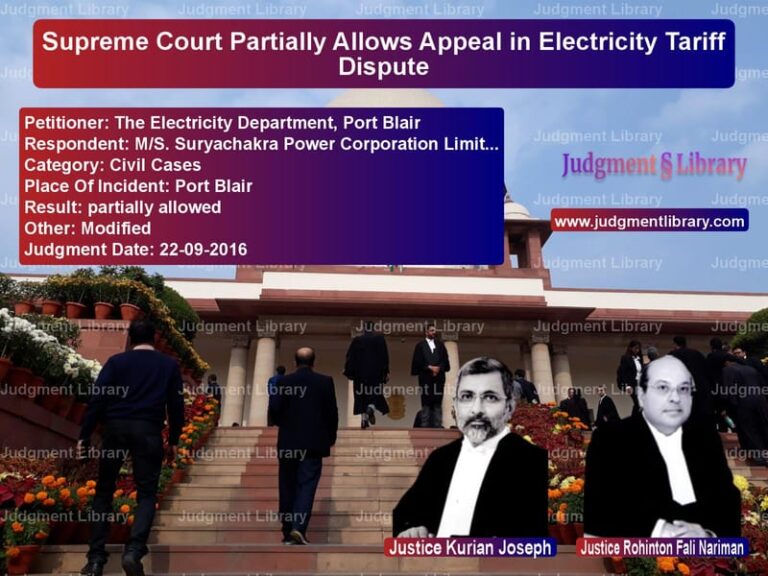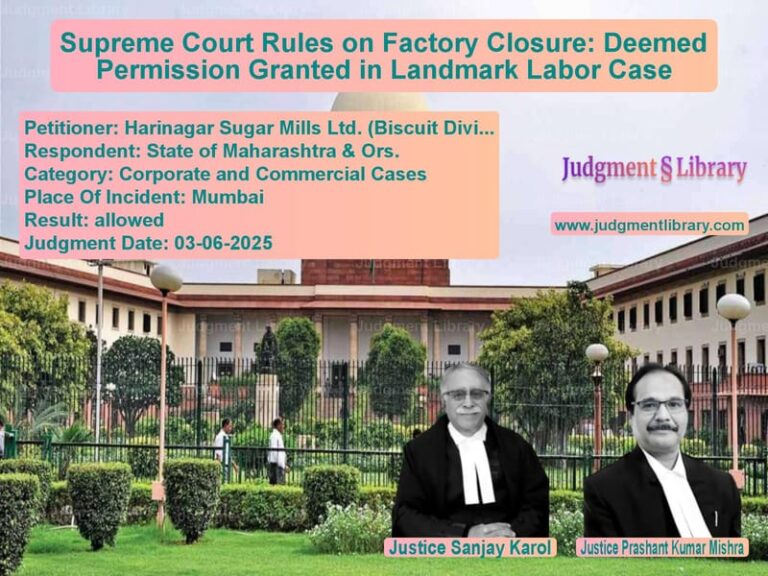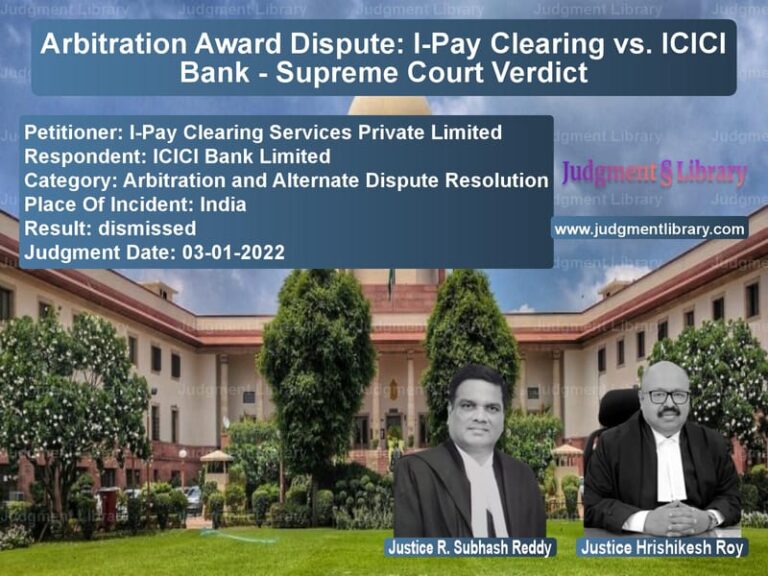Supreme Court Rules on Hindu Succession: Landmark Judgment on Inheritance Rights
The Supreme Court of India, in the case of Karunanidhi vs. Seetharama Naidu & Ors., delivered a significant ruling concerning the inheritance rights of Hindu women and the application of the Hindu Succession Act, 1956. The case revolved around a dispute over ancestral property, raising questions about the extent of a daughter’s right to inherit, the retrospective application of the 2005 amendment to the Hindu Succession Act, and whether female heirs had only a life estate or absolute ownership of the property they inherited.
Background of the Case
The case originated when a dispute arose over the properties left behind by Perumal Naidu, a Hindu male who passed away in 1924. His properties were inherited by his three wives, daughters, and granddaughters under a will executed in 1923. The key question before the court was whether the daughters, who inherited these properties, had absolute ownership or only a life estate.
The petitioner, Karunanidhi, argued that the daughters only had a life interest in the properties and that after their death, the properties should revert to the male heirs of the family. The respondents, Seetharama Naidu & Ors., contended that the daughters had inherited the properties as absolute owners and had the right to pass them on to their legal heirs.
Legal Issues Considered
- Did the daughters inherit the properties as absolute owners or only as life estate holders?
- Did the Hindu Succession Act, 1956, alter the nature of the inheritance?
- Did the Hindu Succession (Amendment) Act, 2005, apply retrospectively to succession cases prior to its enactment?
- Were the heirs of the predeceased daughters entitled to inherit the property under the Hindu Succession Act?
Petitioner’s Arguments
- The petitioner argued that under the Hindu law prevalent at the time of Perumal Naidu’s death, daughters inherited the property only as life estate holders, meaning they could enjoy the property during their lifetime but could not transfer it to their heirs.
- The petitioner contended that the Hindu Succession Act, 1956, did not apply retrospectively to property inherited before its enactment.
- They further argued that the 2005 amendment, which granted daughters equal rights as coparceners, did not apply to inheritance claims arising before its enactment.
- The petitioner emphasized that under the Mitakshara law, daughters were considered temporary heirs who could not alienate ancestral property.
Respondent’s Arguments
- The respondents claimed that once the Hindu Succession Act, 1956, came into force, it granted daughters absolute rights over inherited properties, even if the succession had occurred before its enactment.
- The respondents cited Section 14(1) of the Hindu Succession Act, which states that any property possessed by a female Hindu, whether acquired before or after the Act’s commencement, shall be held by her as full owner and not as a limited owner.
- They further argued that the 2005 amendment, even though enacted later, recognized and affirmed the principle that daughters should have equal inheritance rights.
- The respondents contended that the properties should be divided equally among all legal heirs, including the heirs of predeceased daughters.
Supreme Court’s Observations
The Supreme Court analyzed the legal provisions in depth, particularly Section 14 of the Hindu Succession Act, 1956, which states:
“Any property possessed by a female Hindu, whether acquired before or after the commencement of this Act, shall be held by her as full owner thereof and not as a limited owner.”
The Court made the following key observations:
- Once a woman has inherited property, the Hindu Succession Act, 1956, grants her absolute ownership, regardless of whether she inherited it before or after the Act’s commencement.
- The argument that daughters inherited property as life estate holders before 1956 was invalidated by the introduction of Section 14(1), which conferred full ownership to women.
- The 2005 amendment did not apply retrospectively, meaning it could not be used to justify succession claims that arose before its enactment.
- The heirs of predeceased daughters did not qualify as Class I heirs before 2005 and, therefore, could not claim inheritance under the original Hindu Succession Act.
Final Judgment
The Supreme Court ruled in favor of the petitioner, holding that the daughters inherited the properties as absolute owners, not as life estate holders. However, the Court clarified that the 2005 amendment could not be applied retroactively to cases where succession had already been determined under the older law.
Accordingly, the Court:
- Allowed the appeal filed by Karunanidhi.
- Overturned the High Court’s ruling that had granted the respondents a share in the disputed properties.
- Reaffirmed the principle that legislative amendments cannot be applied retrospectively unless explicitly stated.
Key Takeaways from the Judgment
- Hindu women who inherit property do so with absolute rights, not merely life estates.
- The 2005 amendment does not apply retrospectively to succession cases that arose before its enactment.
- Legal heirs must base their claims on the laws prevailing at the time of inheritance.
- Mitakshara law’s restrictions on female inheritance have been overridden by Section 14(1) of the Hindu Succession Act.
Conclusion
The Supreme Court’s ruling in Karunanidhi vs. Seetharama Naidu & Ors. sets a crucial precedent for inheritance disputes under Hindu law. The judgment clarifies that Hindu women who inherit property acquire absolute ownership and that legislative amendments cannot be applied retroactively unless explicitly provided for.
This case serves as a guiding principle for future disputes involving inheritance rights, ensuring that women’s property rights under Hindu law are fully recognized and protected.
Don’t miss out on the full details! Download the complete judgment in PDF format below and gain valuable insights instantly!
Download Judgment: Karunanidhi vs Seetharama Naidu & O Supreme Court of India Judgment Dated 27-03-2017.pdf
Direct Downlaod Judgment: Direct downlaod this Judgment
See all petitions in Succession and Wills
See all petitions in Property Disputes
See all petitions in Judgment by R K Agrawal
See all petitions in Judgment by Abhay Manohar Sapre
See all petitions in allowed
See all petitions in supreme court of India judgments March 2017
See all petitions in 2017 judgments
See all posts in Civil Cases Category
See all allowed petitions in Civil Cases Category
See all Dismissed petitions in Civil Cases Category
See all partially allowed petitions in Civil Cases Category

